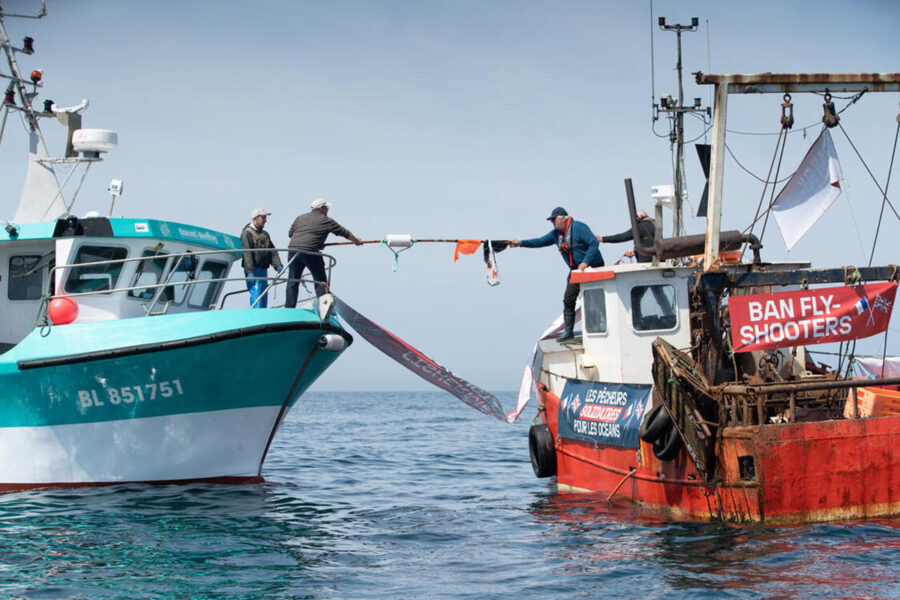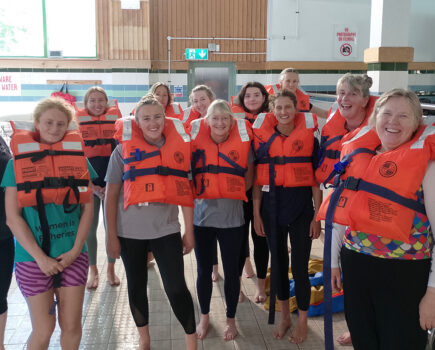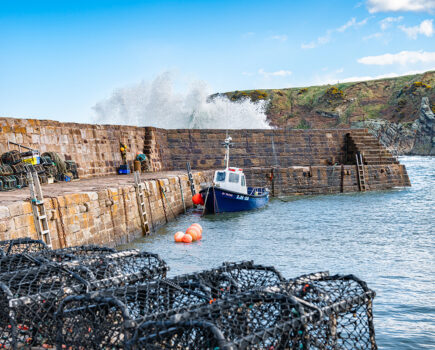The MMO has confirmed the creation of a working group that will address the thorny issue of the future management of non-quota stocks in Areas VIId and VIIe in the English Channel, through the development of a Fisheries Management Plan (FMP), reports Andy Read.
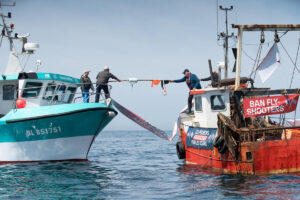
Many of the French and English fishermen protesting about overfishing in the Channel this summer had in mind the larger fly- shooters, targeting non-quota species and landing into European ports, that will have to be included in future management plans for these mixed fisheries. Pictured here are NUTFA leader Jerry Percy and Channel fisherman Martin Yorwarth meeting their French counterparts. (Photo: Suzanne Plunkett/Greenpeace)
The Channel is host to a vast array of different fleets catching non-quota species, from large UK-registered fly-shooters, which initially targeted red mullet and dabs but in more recent years have diversified into a wider variety of species, through to cuttlefish trap boats – and, in fact, any boat in the Channel catching non-quota stocks.
The non-quota stocks FMP is one of a total of 43 planned for development, as agreed in the Joint Fisheries Statement, the far- reaching consultation about management of UK fisheries post-Brexit, which is due to be completed this autumn.
It may also prove to be one of the most contentious and difficult in which to develop consensus from within the industry. It comes against a backdrop of concern expressed across some sectors about the vast imbalance agreed in the TCA, as part of Brexit, of non-quota stocks allowed to be caught by the UK in EU waters (12,365t) and vice versa (33,023t).
This is coupled with concerns about the reliability of many catch and effort figures from some fleets landing into EU ports.
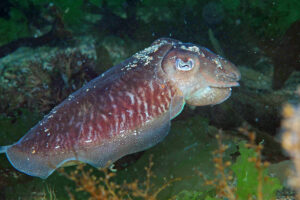
The FMP will also need to incorporate the views, and needs of, vessels as diverse as the Brixham beam trawl fleet, which targets non-quota species such as cuttlefish for several months of the year, and the small vessels using traps in the same fishery. (Photo: Phil Lockley)
The UK and EU have in effect agreed to ignore these tonnages since the TCA was agreed. Certain UK sectors, in particular crab and scallop fishermen, have expressed real concern about potential closures of fisheries in EU waters. Others continue to argue that the EU limits are too high, and in effect make a mockery of the ability of the UK to develop a meaningful management plan in the UK sector of the Channel.
A spokesperson for the MMO said: “We will seek feedback and input from the group on the species to prioritise for the first version of the FMP, its overall development and any potential management measures that could be proposed in the first version of the plan.
“The group is made up of representatives from the fishing industry, local Inshore Fisheries and Conservation Authorities (IFCAs) and the wider supply chain.
“The MMO is committed to making it simple for fishermen to keep up to date with the work of the group, and will publish the minutes of each meeting, which, to begin with, will be held online on a monthly basis.
“The working group is one of a number of ways MMO is engaging with stakeholders on the future management of demersal non-quota species in the Channel.
“We encourage fishermen and interested marine stakeholders to send us their views at: fmp@ marinemanagement.org.uk”
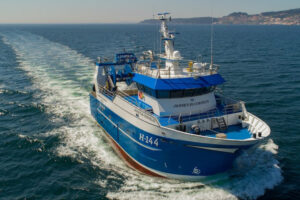
Of the estimated 75 fly-shooters now working in the Channel and southern North Sea, 15, such as the Jannetje-Cornelis H 144 pictured here, are on the UK flag.
Speaking to Fishing News, Barrie Deas, CEO of the National Federation of Fishermen’s Organisations, said: “It’s right that the whole industry and other stakeholders participate in this exercise.
“The difficulty comes where (as is usually the case in fisheries management) trade-offs are required.
“The (relatively) new Finfish Advisory Group, for which Seafish provides the secretariat, is also likely to be important. One key aspect will be how the domestic Fisheries Management Plans work in the context of international negotiations with the EU, either in the annual fisheries agreements, or through the Specialised Committee on Fisheries.”
The non-quota stocks FMP is one of six so-called ‘fast-track’ FMPs that are the first priority for Defra:
• Crab and lobster
• Whelk
• Scallop
• Bass (to be jointly developed with the Welsh government)
• Southern North Sea/English Channel (Areas IVc and VIId) mixed flatfish
The plans are being developed in a variety of different ways, though all of them emphasise that all fishermen can contribute individual views without needing to attend meetings in person.
FN has featured the initial development of the bass FMP through the Policy Lab, a government group that has no expertise in fisheries, but has worked on a range of public reviews and consultations, trying to build consensus between different groups (Fishing News, 28 July, ‘Fishers urged to join bass debate’ and 8 September, ‘Anglers dominating bass FMP debate’).
This included face to face meeting at ports with bass fishermen, as well as a one-week online group, where those involved were invited to log in for 30 minutes a day to share and assess statements about views on the fishery.
Seafish, meanwhile, is chairing the crab and lobster, scallop and whelk groups that are charged with developing FMPs for those fisheries, whilst Defra is running the flatfish working group.
Although the initial plan for the non-quota stocks FMP was for it to be agreed by the middle of 2022, Covid and other delays have seen this pushed forwards.
This story was taken from the latest issue of Fishing News. For more up-to-date and in-depth reports on the UK and Irish commercial fishing sector, subscribe to Fishing News here or buy the latest single issue for just £3.30 here.

